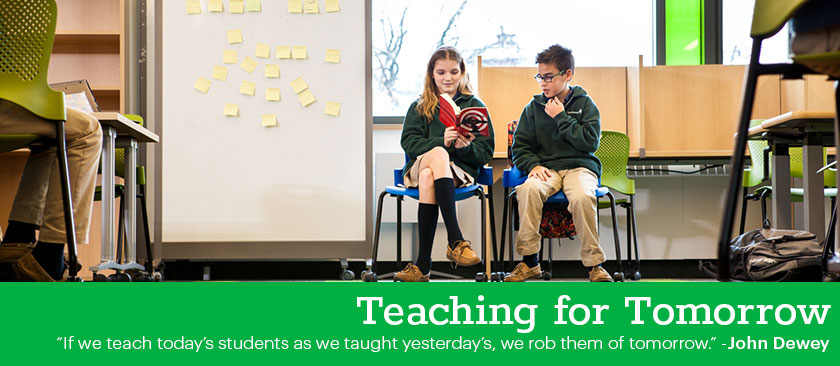 |
| The learn lab classroom allows teachers to offer students different different approaches to understanding a graphic novel like Persepolis. |
In this unit, students:
- Interviewed a peer and wrote a biography based on taken notes;
- Read and reflected on the graphic novel Persepolis;
- Interacted in small-group literature circles;
- Spoke in a conversation assessment about their goals, preferred strategies and impressions from the childhood experiences depicted in the novel; and
- Compared and contrasted how youth in different countries express themselves informally, with their friends and on social media.
Reading an authentic graphic novel is a challenging task, so having two teachers in the learn lab classroom allows us to offer students different approaches to understanding the novel.
- Some students may prefer a more structured reading environment: where they are coached on specific strategies and discuss with the teacher as they read.
- Other students may work independently: with a set of guiding questions and a teacher available if they encounter a stumbling block.
- Still others prefer to read aloud to a peer and create their own summaries and notes.
The flexible nature of the learn lab allows students to move between these methods easily and often (for example, they may prefer teacher guidance on a particularly difficult passage but prefer to read independently on another).
Thinking About Thinking
Metacognition (thinking about thinking) remains a focus in this course. Students continue to set specific goals and spend time considering their progress towards each of the overall expectations for the course. Students can explain in detail what needs to be done in order for them to improve in each strand (reading, writing, listening, speaking).
Students use Google forms to give immediate feedback on their progress, allowing us to focus on areas of particular challenge for each student. For example, many students identified that although they could listen and understand conversation effectively, they were less confident when hearing new accents in a variety of French media. Based on this feedback, we could immediately incorporate more authentic media into the upcoming lessons to help the students progress toward their individual goals.
 |
| Figure 1 |
 |
| Figure 2 |
Figures 1 & 2: Google form results showing how well students feel they understand French when spoken by others vs. how well they understand French in media sources allows teachers to instantly adapt for future lessons
The use of authentic media was also emphasized in the French-teaching workshop attended by both teachers in the previous term. Here we learned to further integrate the Common European Framework of Reference into our day-to-day teaching. This internationally recognized framework is used to objectively place the students on a language continuum (from A1 - beginner, to C2 - mastery) and helps to identify concrete pathways by which language learners can improve.
